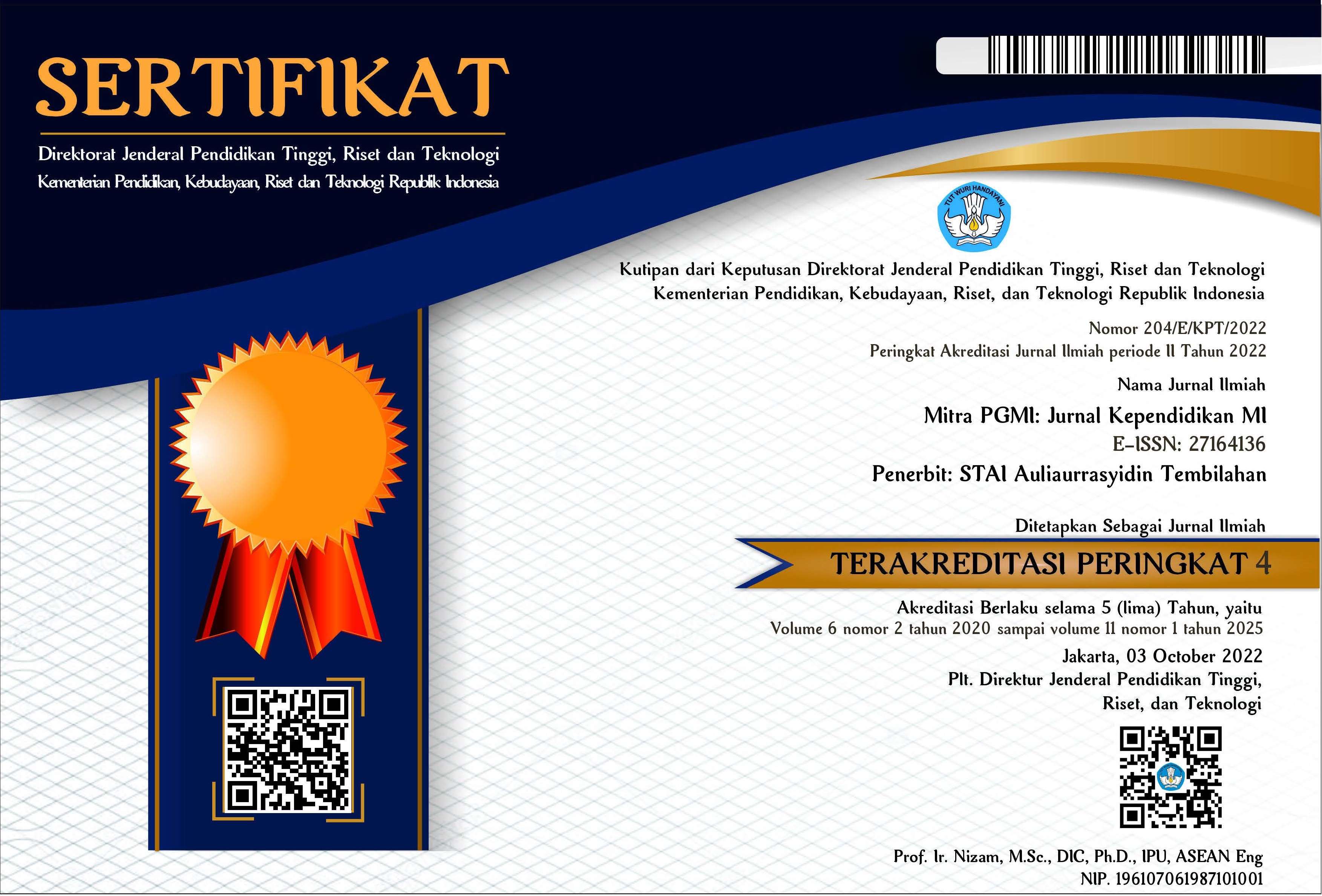Analisis Nilai-nilai Pendidikan Karakter dalam Kitab Akhlaku Lil Banin Jilid 1-2
DOI:
https://doi.org/10.46963/mpgmi.v10i1.1424Keywords:
Value, Character, Book of Akhlaku Lil BaninAbstract
This research aims to identify the values of character education contained in the book Akhlaku Lil Banin by Umar bin Ahmad Bardja volume one and volume two. The research method used is the literature review method, namely by analyzing deeply and systematically related to the contents of the book of Akhlaku Lil Banin as a primary source and other relevant scientific articles as secondary sources. The results of this study show that in the first volume of this book there is character education in the form of polite, honest, obedient, or religious, and responsible qualities, then in the second volume there is the value of character education in the form of religious qualities, filial piety to parents, caring for neighbors, and respecting teachers and friends.
Downloads
References
Ananda Putri, F., Bella Kusumadewi, F., Febriani, V., Putri Suryanto, A., & Psikologi Universitas Semarang, F. (2023). Pentingnya Pendidikan Karakter Pada Anak Sekolah Dasar di Zaman Serba Digital. Journal of Education on Social Issues, 2(3), 204–226. http://journal.qpublisher.com/index.php/jesi/204
Arif, M. (2018). Konsep Pendidikan Akhlak Dalam Kitab Kitab Akhlakul Lil Banin Karya Ibnu Umar Ahmad Barjah. Tajdid: Jurnal Pemikiran Keislaman Dan Kemanusian, 2(2), 401–413.
Aryadiningrat, I. N. L. H., Sundawa, D., & Suryadi, K. (2023). Forming the Character of Discipline and Responsibility Through Character Education. Indonesian Values and Character Education Journal, 6(1), 82–92. https://doi.org/10.23887/ivcej.v6i1.62618.
A’yunin, Q., & Muhid, A. (2022). Pembelajaran Moral Melalui Pembelajaran Kitab Al-Akhlaq Li Al-Banin. Al-Fikri: Jurnal Studi Dan Penelitian Pendidikan Islam, 5(1), 37–55. https://doi.org/http://dx.doi.org/10.30659/jspi.v5i1.21041.
Baradja, U. (1992a). Al-Akhlaq Lil Banin (Bimbingan Akhlak Bagi Putra-Putra Anda Jilid 1). YPI Al-Ustadz Umar Baradja.
Baradja, U. (1992b). Al-Akhlaq Lil Banin (Bimbingan Akhlak Bagi Putra-Putra Anda Jilid 2). YPI Al-Ustadz Umar Baradja.
Candra Destiyanti, I. (2022). Studi Literatur: Bullying Ancaman Nyata Dalam Dunia Pendidikan. Jurnal Education and Development, 10(1), 263–266. https://doi.org/https://doi.org/10.37081/ed.v10i1.3407.
Dela, S., Masudi, & Yanuarti, E. (2020). Efektifitas Pembelajaran Kitab Akhlak Lil Banin Dalam Membentuk Akhlak Santri Pondok Pesantren Miftahul Jannah Karang Jaya. El-Ghiroh: Jurnal Studi Keislaman, 18(2), 153–168.
Dwi Tsoraya, N., Khasanah, I. A., Asbari, M., & Purwanto, A. (2023). Pentingnya Pendidikan Karakter Terhadap Moralitas Pelajar di Lingkungan Masyarakat Era Digital.
Hafidz, N., Azizah, F. N., & Nurul Q, L. (2020). Nilai-Nilai Integritas Anak Dalam Kitab Akhlak Lil Banin Karya Syekh Umar Baradja. Jurnal Penelitian Agama, 21(2), 302–316.
Kuswandi, A. A., & Masitoh, I. (2021). Etika Peserta Didik Terhadap Guru (Studi Analisis Terhadap Kitab Akhlak Lil Banin Karya Syeikh Umar Bin Ahmad Baradja). AUD Cendikia: Juornal of Islamic Early Childhood Education, 01(02), 82–94.
Lestari, I., & Handayani, N. (2023). Pentingnya Pendidikan Karakter Pada Anak Sekolah Khususnya Sma/Smk Di Zaman Serba Digital. Jurnal Guru Pencerah Semesta (JGPS), 1(2), 101–109.
Martuti, U., & Dharin, A. (2023). The Urgency of Character Education in Nashih Ulwan’s Perspective for the “Strawberry Generation.” International Journal of Multidisciplinary Research And Analysis, 06(09). https://doi.org/10.47191/ijmra/v6-i9-59.
Prihatmojo, A., & Badawi. (2020). Pendidikan Karakter di Sekolah Dasar Mencegah Degradasi Moral di Era 4.0. Dwija Cendikia: Jurnal Riset Pedagogik, 4(1), 142–152. https://jurnal.uns.ac.id/jdc.
Revalina, A., Moeis, I., & Indrawadi, J. (2023). Degradasi Moral Siswa-Siswi Dalam Penerapan Nilai Pancasila Ditinjau Dari Pendidikan Kewarganegaraan Sebagai Pendidikan Karakter. Jurnal Moral Kemasyarakatan, 8(1), 24–36. https://doi.org/10.21067/jmk.v8i1.8278.
Sely, J., Sialana, F., & Gaite, T. (2023). Application of Character Education Values in Citizenship Education Courses. JETISH: Journal of Education Technology Information Social Sciences and Health E-ISSN, 2(2).
Shunhaji, A., Sarnoto, A. Z., & Alfa, U. (2022). Model Pendidikan Akhlak Anak Pada Pendidikan Tingkat Sekolah Dasar Perspektif Umar bin Ahmad Baraja (Telaah Kitab Akhlak Lil Banin). Jurnal Statement: Media Informasi Sosial Dan Pendidikan, 12(2), 1–15. https://doi.org/10.56745/statement.v12i2.257.
Suciati, I., Idrus, I., Hajerina, H., Taha, N., & Wahyuni, D. S. (2023). Character and moral education based learning in students’ character development. International Journal of Evaluation and Research in Education, 12(3), 1185–1194. https://doi.org/10.11591/ijere.v12i3.25122.
Sunandari, Maharani, A. S., Yulianti, C., & Esasaputra, A. (2023). Perkembangan Era Digital Terhadap Pentinya Pendidikan Karakter Anak Sekolah Dasar. Journal On Education, 5(4), 12005–12009.
Suryanto, A., Saliman, S., & Sudrajat, S. (2023). Weakness of Character Education in Indonesian Teenager. Jurnal Penelitian Pendidikan IPA, 9(5), 3869–3874. https://doi.org/10.29303/jppipa.v9i5.3721.
Syaripuddin, M., & Luthfiah, A. (2023). Nilai-Nilai Pendidikan Akhlak Menurut Islam Dalam Kitab Al Akhlak Lil Banin Jilid Ii. El Arafah: Jurnal Pendidikan Islam, 2(2), 39–56.
Tim Penyusun. (2011). Bahan Pelatihan Penguatan Metodologi Pembelajaran Berdasarkan Nilai-Nilai Budaya Untuk Membentuk Daya Saing Dan Karakter Bangsa. Pusat Kurikulum Balitbang Kemendiknas.
Waldan, R., & Zainuddin. (2023). Eksplorasi Etika Santri: Penggunaan “Kitab Akhlak Lil Banin” dalam Characther Building di Pondok Pesantren. JWD: Jurnal Manajemen Dakwah, 4(2), 75–129.
Downloads
Published
Issue
Section
License
Copyright (c) 2024 Rivaldi Wiratama, M. Novidayanti, Fatkhul Ilma

This work is licensed under a Creative Commons Attribution-ShareAlike 4.0 International License.
Authors who publish with this journal agree to the following terms:
1. Copyright on any article is retained by the author(s).
2. The author grants the journal, right of first publication with the work simultaneously licensed under a Creative Commons Attribution shareAlike 4.0 International License that allows others to share the work with an acknowledgment of the work’s authorship and initial publication in this journal.
3. Authors are able to enter into separate, additional contractual arrangements for the non-exclusive distribution of the journal’s published version of the work (e.g., post it to an institutional repository or publish it in a book), with an acknowledgment of its initial publication in this journal.
4. Authors are permitted and encouraged to post their work online (e.g., in institutional repositories or on their website) prior to and during the submission process, as it can lead to productive exchanges, as well as earlier and greater citation of published work.
5. The article and any associated published material is distributed under the Creative Commons Attribution-ShareAlike 4.0 International License








2.png)


